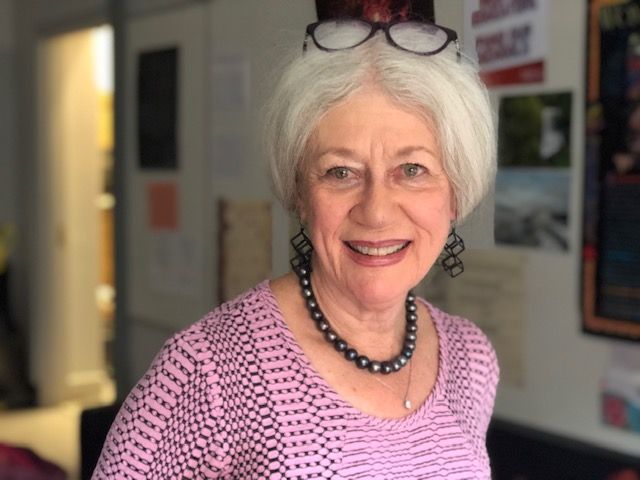
Story, photos and video by Jo Mathis/AAPS District News Editor
The matriarch of Community High School is having a good day.
Her students were prepared for class and participated in a lively discussion. She had some fun conversations with co-workers. A former student home on Thanksgiving break stopped in to see her. She enjoyed a tasty lunch, planned a Friday night dinner with a few other teachers, and hoped to squeeze in some yoga and a bit of reading later at home.
That’s why Judith DeWoskin is always amused to hear rumors of her upcoming retirement or some version of the following:
“My parents say I better sign up for your literature class before it’s too late.”
While it’s a safe bet that DeWoskin will indeed call it quits one day, she is—even at 75—not planning to do so anytime soon.
Why would she?
When a student recently asked her what she’s thankful for this Thanksgiving, she had no trouble coming up with a list.
“I said, `I have beautiful children and grandchildren. I have my husband, Ken, and all of you. I’m in good health I’m active. And I have an amazing job I really, really love.”
The feeling at the 500-student alternative high school is mutual—and then some.
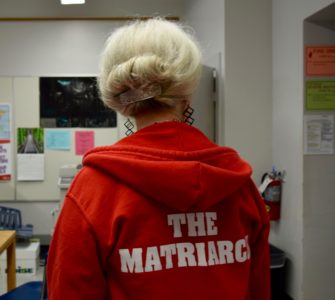
It starts with relationships
English/Forum teacher Robert Morgan says that when he first came to Community, he knew that establishing close-knit relationships with students was paramount.
And no teacher lives out that principle more clearly than Judith DeWoskin, who has now been at Community for 33 years.
“Not only does she know her students, but her students know her,” he says.
He was amazed by the way they wanted to please her. They weren’t saying they had to finish an essay in DeWoskin’s class because their grades would suffer.
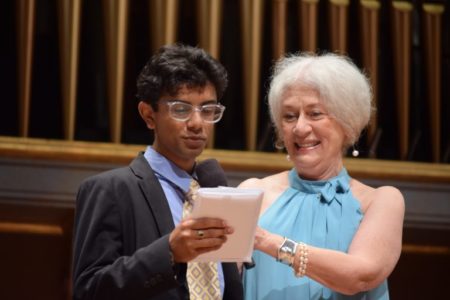
“Instead, they’d say, `I have to do this essay for Judith.’ Or: ‘I owe Judith this,’” he says. “Because they care so much about Judith and they know Judith cares about them, she’s able to bring something out of them as students; draw something out. She sets a bar high that students jump to reach.”
“The truth is those relationships come with honesty and vulnerability. That Judith is willing to speak frankly with kids and talk about what she really thinks kind of laid bare a passion for literature. Kids respond to that. Humans respond to that. If someone is speaking about something about which they’re very passionate, people want to listen.”
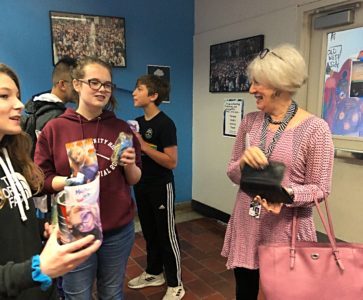
AAPS theater teacher Quinn Strassel says DeWoskin is the best teacher he’s ever met—and is a refreshing, tell-it-like-it-is presence.
DeWoskin can make an otherwise painful professional development (PD) or staff meeting entertaining and productive, Strassel says.
“She is always the one who raises her hand and asks the question we are all thinking but are too embarrassed to ask,” he says. “If she doesn’t understand what was said or has a concern, she raises her hand and says, `Wait a minute, I’m really nervous about that idea!’ or ‘Explain to me what you mean.’ I still remember a PD last year where we talked about students vaping. Nobody wants to talk about bad behavior and the subject of vaping is tough because it is a relatively new and ever-changing behavior. Judith had this really funny way of putting up her hand and saying, `I am freaking out and don’t know what you’re talking about!’ We all laughed and, more importantly, the presenters were able to clarify a bunch of questions we all had.”
DeWoskin’s down-to-earth approach is apparent in her class syllabuses, as in:
Creative Writing: Fall, 2018:
Finally, cell phones are a fact of life, but you may not use them in class. Tell me if your family is in emergency mode, and take any calls from parents out in the hall. Texting suggests that the class bores you and that you are emotionally and intellectually absent; your class participation grade will simply and quietly reflect this behavior in lieu of threats and clever punishments. Be responsible and polite—simple as that. I may not say anything, but I will see you and remember. Pop and coffee are fine if you clean up. Snacks are fine if you bring some for everyone. Who doesn’t still love birthday cupcakes?
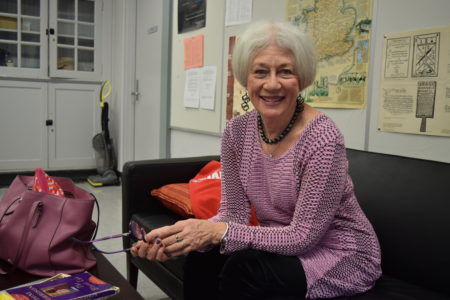
Several of her students said they admire her energy, spunk, relatability, devotion to the students, and her youthful fashion, which includes blue shiny Converse tennis shoes and an old pair of Doc Martens. She shops at Collected Works across the street in Kerrytown, Anthropology, and Gap, as well as markets in China.
As for her hair that is always pulled back into her trademark low bun (unless it’s another steamy summer in Shanghai when she simply lets it turn to frizz): “My hair is a joke,” she says, referring to students’ quips about her trademark do she copied from a schoolgirl skipping down the hall in 1968. Right then and there—when her white hair was brown—she copied the style and never looked back.
“If you told someone to picture a 75-year-old woman with gray hair, you’d have the image of someone in your head,” says sophomore Milo Chalin. “She’s the exact opposite of that. She’s very fast-moving. Very on top of everything. A very great teacher.”
St. Louis native
Judith Mazur grew up in St. Louis, one of three children born to a book-loving homemaker and optometrist who retired at the age of 87.
She attended Washington University in St. Louis for her bachelor’s degree, and would later earn her master’s at Eastern Michigan University.
In 1965, she married Ken DeWoskin, who was working on his Ph.D. at Columbia University and later became a professor at the University of Michigan in the Department of Asian Language and Culture from 1973 to 1999. He also had an adjunct appointment with the Business School and co-directed the China Center for about seven of those years. He is now an independent consultant for Deloitte.
When they were newlyweds, the couple lived in Taiwan for two years and then in New York City before moving to Japan for two years. In Taiwan, she taught English as a second language, and in N.Y. she taught for one year in a private school and two and a half years in a public junior high.
Back in Ann Arbor, DeWoskin taught one year at Tappan Middle School as well as one semester at Pioneer and one at Huron high schools.
But when she got the chance to move back to AAPS’ alternative high school, she snatched it.
Not only do the CHS faculty have more freedom to design their own classes as long as all standards are met, but she’s convinced her colleagues are top-notch.
Reluctant to reduce hours at school
Before the start of last school year, she took a fellow teacher’s advice to try cutting back her schedule to 60 percent (with the hope that she’ll be able to continue teaching that much longer).
She quickly realized she was uncomfortable with it. Staying home on Mondays and Wednesdays felt odd; she was missing out on getting to know the new ninth graders as she was no longer teaching Intro to Lit.
This year, she’s better about it, and tries very hard to do things (yoga, swimming lessons, quilting, cooking) on her days off that are not school-related.
Sometimes—to the delight of staff and students alike—she can’t help but bring some of that home-made cooking to school.
“She is constantly running down the hall to have me try a new dish, and no matter what it is, it is always fabulous!” says fellow English teacher Matt Johnson. “She is also is ultra generous and regularly hosts parties for the whole school where she both opens up her house and cooks for days on end beforehand.”
Calling DeWoskin his “North Star of English teaching,” Johnson says she embodies everything a good teacher should be.
“She inspires and motivates the students in a way that no one else can do,” he says. “When she hosts her “D-WOW Halloween Dance,” the entire student body shows up in costume and when she assigns even the hardest books like “The Grapes of Wrath” or “The Scarlet Letter,” the students read and engage with them in a way that I could only dream of. She also is endlessly evolving and growing as a teacher, which is all the more impressive, as she already has decades of wonderful lessons built up.”
He says the relationships she builds with students are some of the strongest he’s ever seen, noting: “I’ve never seen a teacher with such an endless parade of ex-students of all ages coming to visit her, which is a testament to the fact that she truly cares deeply about each and every student.”
CHS grads keep in touch
In fact, during an interview, one of her former students stopped in to visit while home for Thanksgiving. Sam Millman says DeWoskin helped him become a better writer—a skill he uses constantly at Michigan Tech.
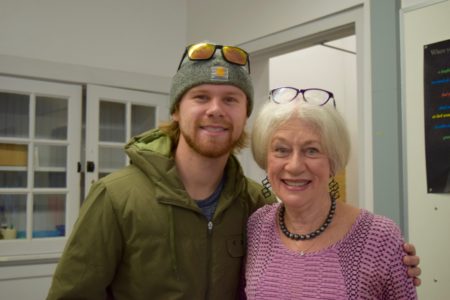
“I haven’t scored less than 90 percent on an essay in college,” he says, recalling how he hated to write when he got to Community. “My freshman college English class turned out to be a breeze because I knew how to find a good thesis and write a great paper.”
Sam says DeWoskin also helped him grow up during twice-weekly forums and recalls how she would tell his mom that he was immature.
“You were a butthead sometimes!” she responds, noting that she uses the word with affection. “But you got mature. You really grew up. One of the beauties of forum is that you have kids, not in an academic class, but you see them over four years grow from these squirrelly little freshmen to these really thoughtful amazing seniors. Which is what happened to you.”
While she’s known for her twice-weekly forum and all those activities, she says the bottom line is that she’s a teacher.
She’s designed a variety of classes, and through the years has taught Introduction to Literature; American Literature; Chinese Literature and Culture; Japanese Literature and Culture; Creative Writing; Short Story Writing; Hyphenated American Literature and Women’s Literature—a course she designed last summer and is teaching now.
“I don’t work the kids any harder than I work myself,” she says. “But I do want kids to read and write. That’s for sure.”
Dewoskin recalls the time she was battling an eye infection and in the worst mood. She’d just started a review for an exam when in walked Assistant Dean Karen Siegel to observe her.
“I thought, `What kind of luck is this!’”
Later, when she approached Siegel to explain what had been going on, Siegel said, “What are you talking about? All I could think of was: `How can she be this excited about books that she’s read a thousand times?”
Dewoskin says the excitement is real because the students haven’t read the book a thousand times.
In fact, Dewoskin says she’s a new and improved teacher every semester because while she may be reading the same books again, she’s reading those same books with different students who come with their own unique ways of looking at the work.
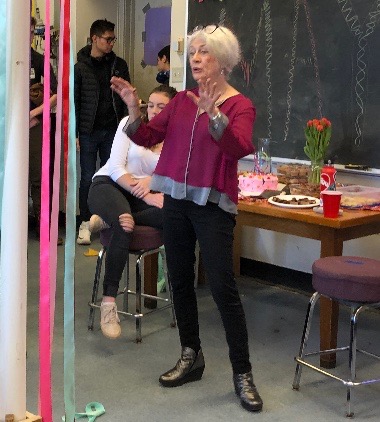 That keeps her interested in what they have to say.
That keeps her interested in what they have to say.
Essays rule
DeWoskin by no means subscribes to the teaching tip to: “Tell ’em what you’re going to say, say it, and tell ‘em what you said.”
“People who say that really don’t understand the beauty of analysis,” she says. “When students take a quotation from a book and put it in a paper, that analysis of those quotes is so creative and so smart.”
One of the great joys of her job is watching how far the students writing’ improves during their four years at Community.
“Part of it is just them growing up and being mature,” she says. “And the rest is because we make them do it and do it and do it.”
DeWoskin gets to know her students well because she reads everything her students write – and she assigns a whole lot of essays, some of which are analytical and some of which are personal.
Students know she is always available – whether that’s in person or via email – or (if they must) via text.
“I have a lot of ideas about content and books that I’ve read and things I think students should know,” she says. “But I think the most important part of teaching is hearing what they need to know and what they think of the books and seeing how far they’ve come in a certain amount of time.”
So if she’s grading an essay, she doesn’t rely on just one criterion to grade it.
“I have to know each student, where that student started, and how much improvement that student is making,” she says. “It’s really important to be responsive to their ideas, and hear their ideas, and take their ideas seriously and not be patronizing.”
As for her own writing, DeWoskin limits it mostly to thoughtful letters of recommendation for students’ applying for college. Only three times in 33 years has she had to decline to write such a letter, knowing that she wasn’t the best person to ask.
“I cut deals.”
Robert Morgan agrees that the basis of the English curriculum at Community is in the analytical essay.
“We drive kids in class to express themselves vocally,” he says. “But also to express themselves in writing. Judith turns students into better writers through the very act of repetition. You do it and you do it some more and then you do it again. It’s like any skill. The best way is just practice. And so they write tons of essays.”
But from an English teacher’s point of view, there’s a drawback to assigning lots of essays.
“That puts so much work on the constant feedback you have to give to students,” says Morgan. “Unlike some sort of casual assignment or type of assessment, in essay writing, you have to constantly give feedback. This plays into her personality. She can develop these relationships because not only is she having conversations with kids in class, but she’s having conversations in writing.”
Indeed, DeWoskin recalls times when her kids were growing up, she and her husband would make themselves a pot of coffee at 10 p.m. and sit down to do homework—hers in the form of grading essays for the next three hours or so.
She says she’s both patient and energetic, which help. And she’s not above bribery. She’s also known to call parents for “brag calls, worry calls, butt kick calls.”
Just the other night a student who doesn’t like to read called her to say she couldn’t write an essay because she didn’t finish the book.
DeWoskin assured her that she should go ahead and start the book the class had just begun so that she wouldn’t fall behind there, as well. Then later she could go back, finish the first book, and write the paper.
“I cut deals,” she says.
Princess Escalus
DeWoskin once played Princess Escalus in Community’s production of “Romeo and Juliet.”
It’s a part written to be Prince Escalus.
“But Judith is definitely the Princess of Community High so we made an adjustment,” recalls director Quinn Strassel. “She was, of course, terrific but I think she was also a little nervous during the rehearsal process. Judith approaches every moment of her life with openness and honesty and so she shared her feelings of nervousness with the student members of the cast. I think that gave everyone permission to ask questions and feel OK about it being hard to perform Shakespeare.”
He says that production was one of his best because of her contributions onstage and off.
No talking down to students
Hannah Rubenstein. who graduated from CHS in 2017, has known DeWoskin all her life because her mother, Anne Thomas, is a math teacher at Community.
“Judith and her husband Ken were always two of the smartest people I knew and among the first to speak to me like an adult in intellectual conversations rather than a child,” recalls Rubenstein, a sophomore English major with a theater concentration at Barnard College.
During her years at Community, she took five classes with DeWoskin.
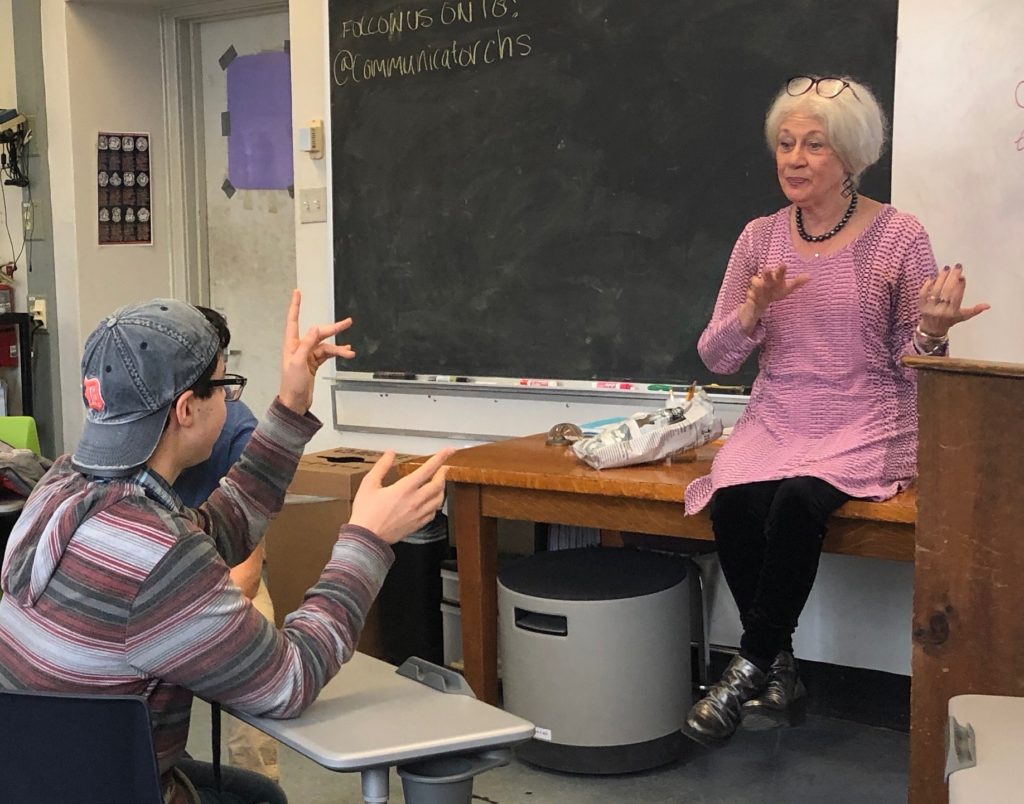
“Some of my favorite memories in those classes were her shutting down a student’s sexism when he said that Curley’s wife in “Of Mice and Men” was to blame for her own murder, watching her Charleston during our “The Great Gatsby” unit, and sharing lunch while we discussed “Raisin in the Sun,” among far too many to count,” she says. “One thing I really admire about Judith is how she encourages students to engage in texts in a way that is driven by what they are passionate about and how she does not see herself as being above that engagement. For example, Judith is an amazing cook, so she would regularly bring in foods like the ones characters were eating in whatever books we were reading so that we could experience what they would’ve had.”
Rubenstein says that to this day, the best compliment she’s ever received was from DeWoskin, commenting on two vignettes Rubenstein had written about the death of her sister of leukemia.
“She told me that after reading these, she was sure I was a writer and that I should show my work to others,” recalls Rubenstein. “She said she wanted to make sure she was alive for my first book signing.”
“All in”
Longtime colleague, Tracy Anderson, considers DeWoskin one of her best friends despite a 30-year age gap.
“He claimed that this teacher Judith was engaging students in a way that at once respected them and also inspired an incredibly high level of academic participation,” McGraw recalls. “The next day I visited Judith’s class to see this for myself. Judith immediately integrated me into her class activity, which was a choral reading of a long poem. I was so blown away that I hung around after class and begged to student teach with her. It turned out to be one of those days that drastically altered the course of my life in countless positive ways. It’s safe to say Judith has had that effect on a lot of folks who have entered her classroom.”
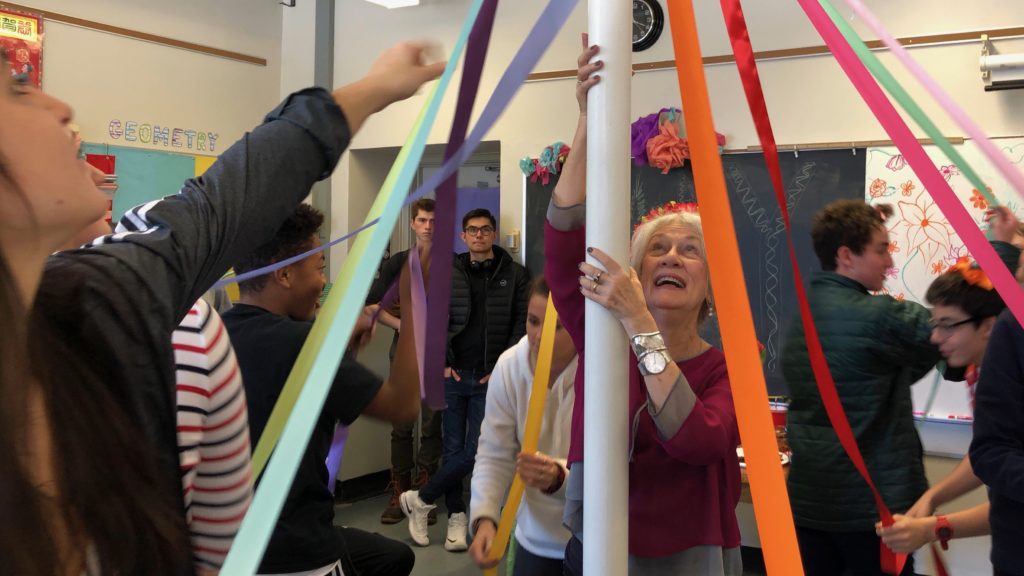
“I told him,`Well, I’m at my job. It’s my profession. I have to be cheerful. I’m not screaming at you to put your socks away,’” she recalls. “That doesn’t mean I can’t be a cranky pants at school because I can. Because I’m opinionated. But I’m also really flexible.”
Family ties
Asked the secret for her long happy marriage, DeWoskin jokes that living on two continents doesn’t hurt.
“The truth is we adore each other, and we always agree on what’s really important,” she says.
Ken DeWoskin works in China now and lives there about half time. She visits in the summers, and occasionally during spring break.
Their daughter, Rachel DeWoskin, lived in China for about six years, working in a public relations firm in Beijing. She also starred in a popular TV series, “Foreign Babes in Beijing,” which is also the title of her memoir. Rachel, a creative writing professor at The University of Chicago and author, is married to playwright Zayd Dohrn, a professor and playwright at Northwestern University, and they have two daughters.
Son Jacob is a cyber-security expert, an IT consultant, and now a teacher of cyber-security issues. He is the father of two and lives in Minnesota.
Younger son, Aaron, has lived and worked in Beijing and Shanghai as an architect for about eight years and now works on music, art, and architecture.
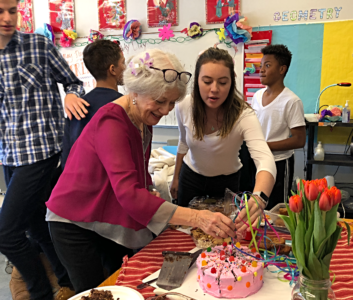
A Community High School “installation”
When Robert Morgan calls DeWoskin an “installation of the building,” she laughs and says he means she’s “like a light fixture or something.”
“No,” he says. “You’re like a staircase. A lamp we can change. If the staircase gives out, kids aren’t getting anywhere.”
DeWoskin is three days older than her husband. And their fathers were each pushing 90 when they retired.
So while they talk about full retirement, they’re not even tempted.
“We think we’re not genetically wired to retire,” she says. “And to be totally honest, retirement’s scary. A lot of my friends say it’s wonderful and they do this and they do that, and you can make so many more quilts. Well, I get the quilts made anyway. And I can’t talk to a quilt.”

Wonderful article about Judith! Everything here is spot on. She is all that, and a bag of chips.
As a parent of two CHS students, I am eternally grateful to Judith and all the amazing teachers at CHS. They have far-reaching impact on these young people’s lives.
She is the spirit and heart of CHS and has been for 33 years.
Judith is indeed an iconic English teacher. Judith would be irreplaceable should she ever choose to retire.In addition,she is one of the kindest and most generous human beings I have ever had the pleasure of calling my friend .
Rocky